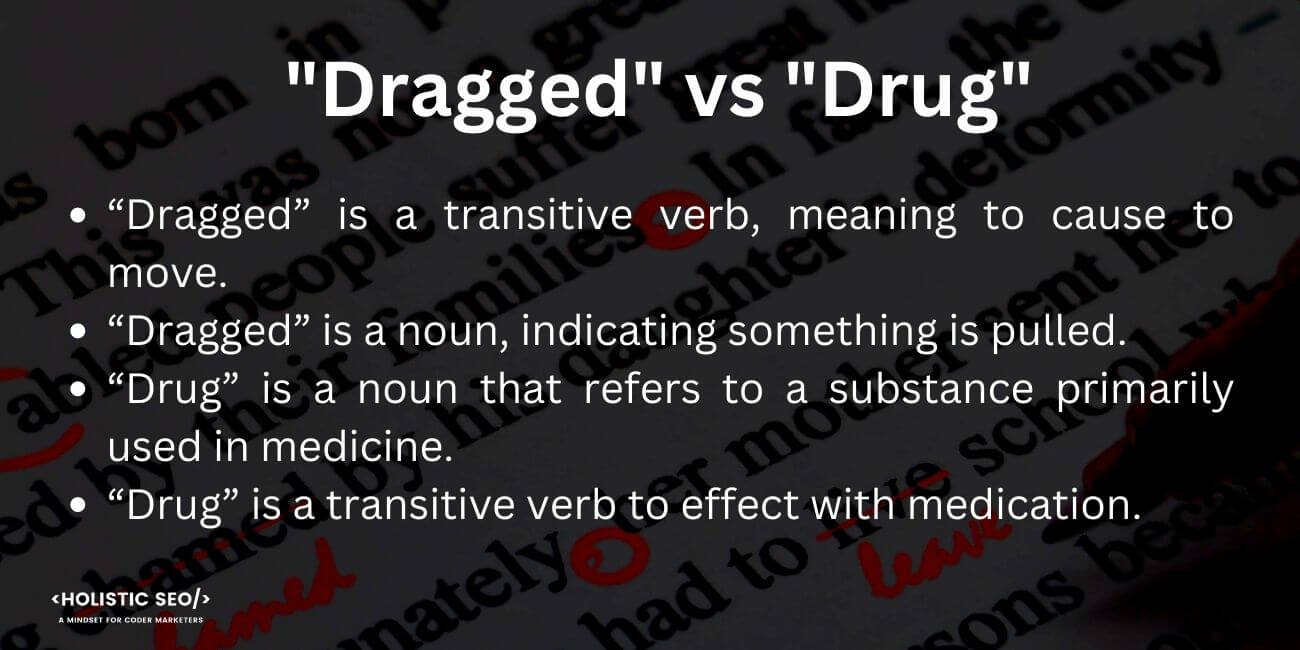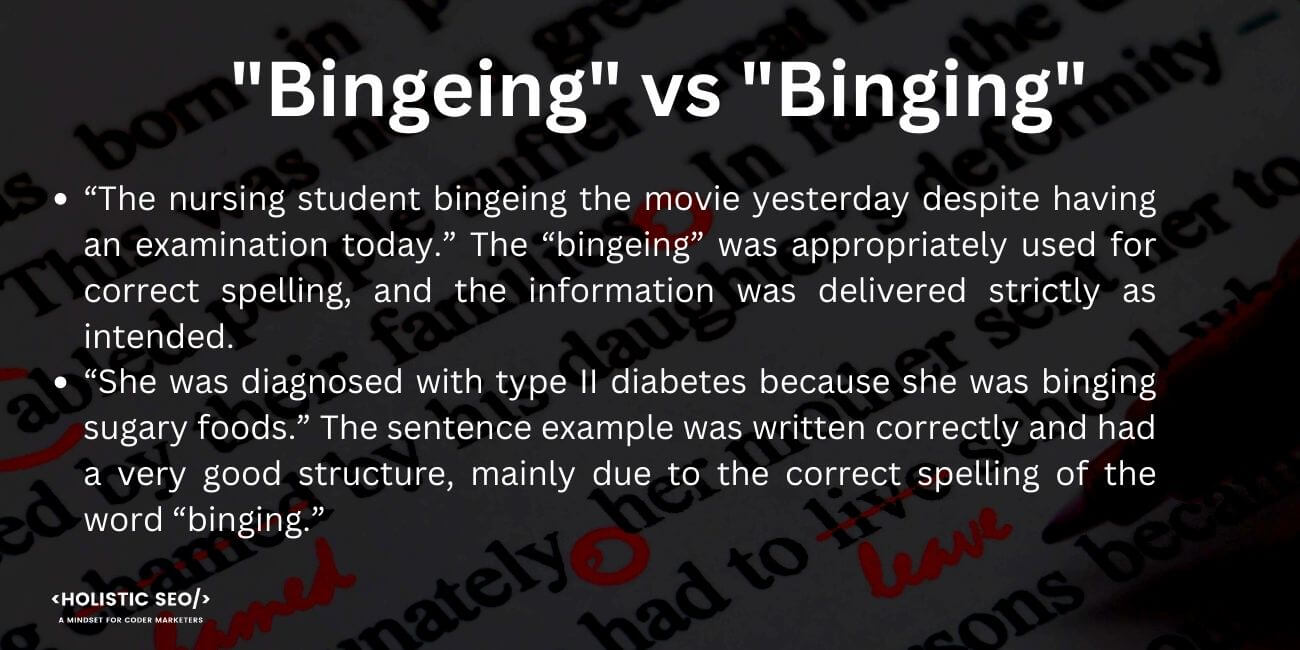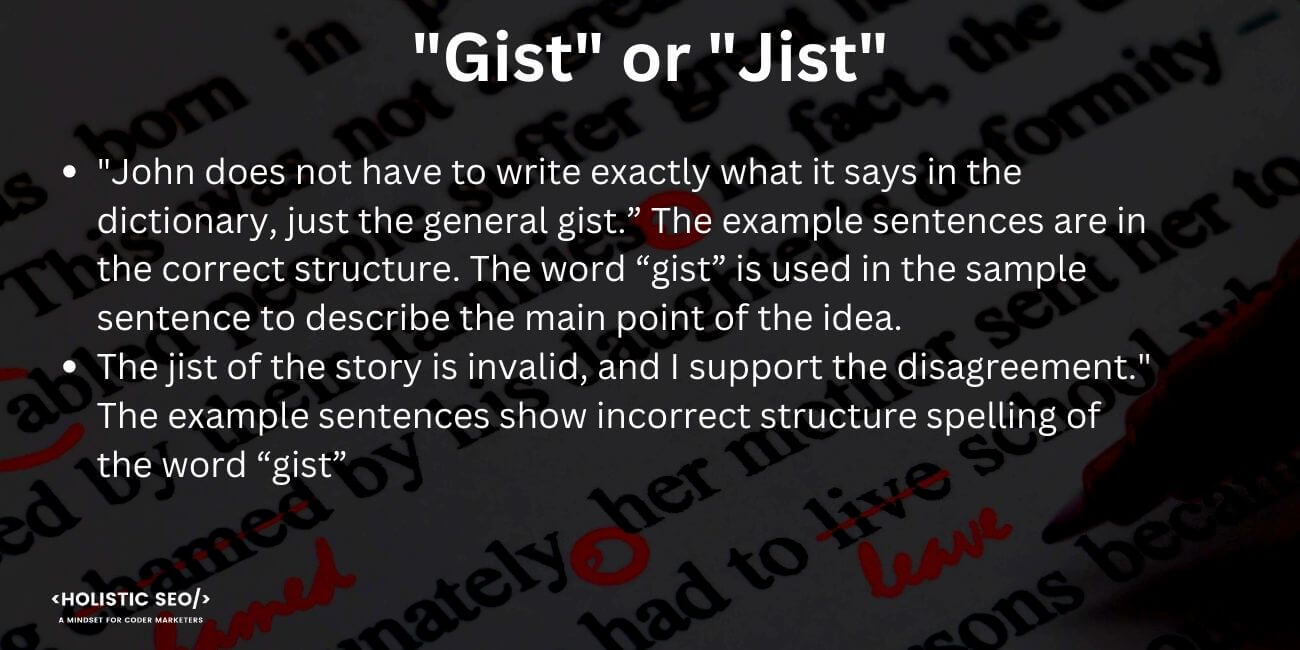“Dragged” and “Drug” are two words often confused because both seem like variations of the verb drag, which means pull. However, both words have separate meanings and spellings. “Dragged” is the past tense of the regular verb “Drag,” meaning to move something by pulling it along with effort or difficulty. “Drug,” on the other hand, is a medication or any psychoactive substance. “Drug” in its verb form means to administer a drug. Confusing words like “Dragged” and “Drug” are used regularly when communicating. Use the word “Drug” when referring to medicine. Use “Dragged” when referring to the motion of pulling something in the past tense. One must understand and remember their meaning to correctly use both words. Committing grammar and spelling errors is common among people. However, learning each word’s proper spelling and meaning is vital to avoid miscommunication. Many conversations are incomprehensible simply because of incorrect word usage and spelling. Check the dictionary to know the words’ meanings to avoid these mistakes.
Listed below are the comparison between the words “dragged” and “drug.”
- “Dragged” means to move something or someone harshly.
- “Dragged” is the past participle of “Drag.”
- “Dragged” is a transitive verb, meaning to cause to move.
- “Dragged” is a noun, indicating something is pulled.
- “Drug” means a substance used in medicine.
- “Drug” is a noun that refers to a substance primarily used in medicine.
- “Drug” is a transitive verb to effect with medication.
Identifying when and which words must be used in a sentence to deliver the correct message or information is essential. Writers understand and study the correct spelling and meaning of each word. Writers know when and how to use words like “Dragged” and “Drug” in writing. Words that look and sound alike are often misused, resulting in spelling and grammatical mistakes. However, these mistakes are avoidable if someone is writing carefully. Writers do proofread to check if there are any spelling mistakes or grammar errors in their articles.
Proper usage of words like “Dragged” and “Drug” in a sentence matters because one must convey factual and accurate information. Some example sentences using the words “Dragged” and “Drug: “Amanda dragged her boots through the mud.” The word “Dragged” in the sentence is used as a verb. One example of a sentence using the word “Drug.” “Drug addiction is one main problem of many countries.” “Drug” is used as a noun in the sentence example, referring to an illegal substance.
Using the correct terms or words is very helpful in daily life, content writing, and marketing. Words are powerful, especially in marketing because people communicate through words. Marketers use specific and appropriate words to encourage people to buy the product they are promoting. They used informative words to entice and capture the interest of future customers. Using the correct words in marketing has the power to attract customers. Writers must understand why to know the difference between “Dragged” and “Drug” for content writing and marketing. Proper usage of words always matters. Writers must choose their words correctly and write them properly to convey a message. The same thing applies to content writing. Writers must be knowledgeable about the proper terms and words to write good-quality content. Content writers communicate with their readers by writing correct and informative articles.
What does “Dragged” Mean?
“Dragged” is defined as pulling something with difficulty, or drawing with force. “Dragged” came from Middle English draggen (“to drag”), early Middle English dragen (‘to draw, carry”), junction of Old English dragan (“to drag, draw, draw oneself, go, protract”), and Old Norse draga (“to draw, attract”); both from Proto-Germanic dragana (“to draw, drag”), from Proto-Indo_European dʰregʰ- (“to draw, drag”). “Dragged” is the past tense of “Drag” which means “to draw,” and originates from the 14th century. The Oxford Dictionary defines “Dragged” as pulling somebody or something with effort and difficulty. “Dragged” is a common English word used in daily conversation. It is important to understand its proper usage for efficient communication. The word “Dragged” must not be mistaken with the word “Drug” because the latter refers to a medicine or an illegal substance.
What are the sentence examples with “Dragged”?
Below are sentence examples using “Dragged”.
- “Every morning, Caroline dragged herself out of bed as soon as she heard the alarm.” The word ‘dragged” is used as a verb in the sentence.
- “The little boy dragged his school bag while walking toward the bus stop.” The word ‘dragged” is used as a verb in the sentence.
- “Joey, dragged the chair to the table and held it for the old lady.” The word ‘dragged” is used as a verb in the sentence.
- “You dragged me into this mess.” The word ‘dragged” is used as a verb in the sentence.
- “She seized her by the arms and dragged her to the door.” The word ‘dragged” is used as a verb in the sentence.
When to use the word “Dragged” in a sentence?
Use the word “Dragged” when discussing the act of pulling something or stating something passed slowly or was boring. “Dragged” is the past tense of the verb “drag.” Drag means to pull something harshly. It is a transitive verb that always refers to a movement. “Dragged” describes pulling something with exaggeration. “Dragged” is mostly used in a sentence when describing a violent or harsh movement. Sometimes it refers to something boring. An alternative for the word “Dragged” is to “draw.”
What does “Drug” Mean?
A drug is a chemical substance that changes an organism’s physiology or psychology when taken. Drugs usually are distinguished from food and substances that give a nutritional contribution. The etymology of the word “Drug” comes from Middle English drogge (“medicine”), from Middle French drogue (“cure, pharmaceutical product”), from Old French drogue, drocque (“tincture, pharmaceutical product”). It came from Middle Dutch or MIddle Low German droge, as in droge vate (“dry vats, dry barrels”), mistaking droge for the contents, often dried herbs, plants, or wares. Droge was derived from Middle Dutch drōghe (“dry”), from Old Dutch drōgi (“dry”), from Proto-Germanic draugiz (“dry, hard”), from Proto-Indo_European dʰrewgʰ- (” to strengthen, become hard or solid”), from dʰer- (” to hold, hold fast, support”). Associated with English dry, Dutch droog (“dry”), and German trocken (“dry”). The Oxford Dictionary defines the word “Drug” as an illegal substance that some people smoke, inject, etc., for its physical and mental effects. “Drug” first appeared in Middle French and English in the late 14th century, without a recorded predecessor. It primarily meant “any substance, of animal, plant, o mineral origin, used as a pharmaceutical ingredient in pharmacy, chemistry, and other manufacturing methods. The word “Drug” is a common English word used by many. Knowing proper word usage is essential because it makes communication easier and more understandable.
What are the sentence examples with “Drug”?
Below are example sentences with “Drug.”
- “The doctor gently administers the drug.” The word “Drug” refers to medicine and is used as a noun.
- “Our former neighbor began a life of drug abuse and alcohol.” The word “Drug” refers to an illegal substance.
- “Rehabilitation centers focus on helping drug addicts.”The term “Drug” was used to describe an illegal medicine used by people which lead them to a rehabilitation facility.
- “The drug is effective in fighting bacteria.” The word “Drug” refers to medicine and is used as a noun.
- “Drug manufacturing is the most profitable business in the U.S.” The word “Drug” refers to medicine and is used as a noun.
When to use the word “Drug” in a sentence?
“Drug” is used in a sentence when referring to medicine or any illegal substance. The word “Drug” is both a noun and a verb. “Drug”, when used as a verb, means to administer a drug. The word “medicine” is synonymous with “Drug”. Using the word “Dragged” as an alternative for “Drug” is incorrect. “Dragged” is a different word and is not relatable to “Drug.”
What are the synonyms of “Drug”?
The word “Drug” has several synonyms that are used as an alternative for the word. Some synonyms of “Drug,” when used as a noun, include medicine, antidote, potion, remedy, cure, narcotic, stimulant, and medication. “Drug,” is synonymous with poison, narcotize, and anaesthetize when used as a verb. Here are sample sentences using the synonyms of “Drug”: “A former narcotic (drug) dependent happily goes out of rehab today.” “A new wonder medicine (drug) is available in the market and is known to cure a lot of diseases.”
Are the words “Dragged” and “Drug” interchangeable?
No, the words “Dragged” and “Drug” are not interchangeable. “Dragged” and Drug” function differently in a sentence, one as a noun and the other as a verb. The confusion among these words is due to the past tense verb. “Dragged” is the past tense of “Drag.” Some people mistakenly use these words because they sound alike.
Comparison between “Dragged” and “Drug”
Below is a table comparison between “Dragged” and “Drug”.
Listed below is the table that shows the comparison between the words “who” and “whom.”
| The English Words | Definition | Context | Example Sentences |
| Dragged | Pull something or someone along forcefully or roughly. An alternative definition of “Dragged” is something that seemed to take a long time. | “Dragged” is a past tense verb that refers to pulling along a surface. “Dragged” is the past tense of the word “Drag.” | He dragged the heavy backpack off the train and into the house. She was dragged into a scandal. Chloe immediately dragged her broken bike into the garage. |
| Drug | A medicine or any substance that has an adverse effect when taken. | The word “Drug” is used in a sentence as a noun and a verb. As a noun, it is primarily referring to treatment or diagnosis. As a verb, drug means to administer medication. | She was ashamed of her past job as a former drug dealer. Drug trafficking is a serious offense. The newly invented drug is set to arrive next year. |
Why are “Dragged” and “Drug” misused and interchangeably in English?
The words “Dragged” and “Drag” are often mistaken for their spelling and usage. “Dragged’ and “Drug” have the same pronunciation, and, understandably, people get confused with them. People rely mostly on the sound of words. The word “Drug” and the term “Dragged” both function as two distinct parts of speech, a noun, or a verb. The words are not related. The confusion comes because of the similarity in pronunciation.
Are “Dragged” and “Drug” the most commonly misused English words?
Yes, “Dragged” and “Drug” are among the most commonly misused English words. However, these misused words affect someone’s delivery of a message. Misused words result in misinformation and confusion. The English language is a tricky one. Frequently, some words are used interchangeably. These words are regularly mistaken for spelling and usage. Some repeatedly misused English words have similar pronunciations but distinct meanings. Other people find it hard to identify the right one in a given context. Some commonly misused English words are “it’s and its”, “affect and effect”, “complement and compliment”, “farther and further”, “inquiry and inquiry”, “a lot and allot”, “your and you’re”, “principal and principle”, and so many others.
What are the other similar Misused Word Pairs like “Drug” and “Dragged” in English?
Below are other similar Misused Word Pairs like “Drug” and “Dragged.”
- “Accept and Except”: “Accept” and “except” are similar misused word pairs in English like “drug” and “dragged.” The two words have almost the exact spelling except for their first two letters, ending with the word “cept.” “Accept” and “except” sound alike, the same as the words “dragged” and “drug.” However, their meaning is very far away from each other. The term “accept” means receiving something, while the word “except” means excluding or other than.
- “Effect and Affect”: The English terms “effect” and “affect” are commonly interchanged in sentences. “Effect” and “affect” are homonyms, and their pronunciation is closely the same. On the other hand, their spellings only vary in the first vowels used which are “e” for “effect” and “a” for “affect.” The definition of “effect” and “affect” are distinct. The term “effect” refers to the result or consequence of an action. On the other hand, “affect” means to make a difference.
- “Further and Farther”: The words “further” and “farther” are words that are often confused the same as “dragged” and “drug.” The words “further” and “farther” have subtle differences in terms of their pronunciation. Apart from that, the only distinguishable characteristic in their spellings are the usage of “u” in “further” and “a” in farther.” The meaning of “further” is additional to what already exists or has already taken place, been done, or been accounted for, while “farther” means at, to, or by a great distance.
- “Breath and Breathe”: “Breath” and “breathe” are words that frequently cause misinterpretation in English just like “dragged” and “drug.” The words “breath” and “breathe” have a slightly similar verbal sound when being read. Additionally, their spellings are only varying in the end part where “breathe” has an added vowel “e” compared to “breath.” The word “breath” is defined as the air taken into or expelled from the lungs. Meanwhile, the word “breathe” refers to taking air into the lungs and then expelling it, especially as a regular physiological process.
- “Elicit and Illicit”: The terms “elicit” and “illicit” are comparable to “dragged” and “drug” because they are typically misused in English. “Elicit,” “illicit,” “dragged,” “drug” are homonyms that possess related-sounding pronunciations. The word “elicit” is spelled with the letter “e,” while “illicit” is formed with the letter “i” and an extra letter “l.” The meaning that the word “elicit” bears is “evoke or draw out.” On the contrary, “illicit” means “forbidden by law, rules, or custom.”
What are the things should a content writer consider in using the word “Dragged” and “Drug”?
Content writers take a lot of consideration when writing. They need to consider their audience, platform, and spelling when using the words “Dragged” and “Drug.” Content writers are skilled and knowledgeable writers that follow strict rules when it comes to grammar and spelling. They use words and terms appropriate for their readers to understand their articles.“Dragged” and “Drug” are two words having different meanings.
Can content writers use “Dragged” and “Drug” in one sentence?
Yes, content writers can use “Dragged” and “Drug” in one sentence. Although both words are almost the same in pronunciation, they have different meanings, and using them in one sentence is possible. Here is a sample sentence using the words “Dragged” and “Drug;” The police officer immediately dragged the suspected drug dealer out of the car. The two words are appropriately used in the sentence example. “Dragged” is used as a verb, and “Drug” is used as a noun.
How do Content Writers use “Dragged” and “Drug” in their articles?
Content writers use “Dragged” and “Drug” carefully and adequately. Content writers do not interchangeably use “Dragged” and “Drug” in their sentences. The word “Drug” is never the correct alternative for the past tense of “Drag.” The word “Drug” is used by content writers when referring to an addictive substance or medication. “Drug” is even used as a verb in some instances. “Drug” means to administer medicine in its verb form. Content writers used “Dragged” as a transitive verb that reflects a movement, sometimes sluggishly or painfully. Content writers always use appropriate and grammatically correct words, which is very important in Content Writing.
Do Content Writers use “Dragged” and “Drug” in the wrong way?
No, content writers do not use “Dragged” and “Drug” in the wrong way. Often, these words are interchangeably used in a sentence. However, content writers are skilled writers who practice grammatically correct English. Content writers possess the proper knowledge when it comes to writing. Proficient writers know how and when to use the right words in their sentences. Content writers are not able to convey a proper message if they commit repeated grammatical errors. The English language contains confusing words that sound alike but are spelled differently and have distinct meanings. Others are confused by the words “Dragged” and “Drug” because they sound the same. One way of ensuring that there are no grammatical errors in an article is by reading it several times and understanding the meaning of the words.
Do Misused Words such as “Drug” and “Dragged” affect SEO and UX?
Yes, words such as “Drug and “Dragged” affect SEO and UX. Misused words impact SEO. “Dragged” and “Drug” are sometimes used interchangeably. Understanding the proper spelling of every word is still important to better communicate. Grammatical errors in writing unintentionally alter what authors want to convey. It is either a wrong spelling or a misuse of terms. A misused word in a sentence delivers a different meaning to the reader. The same thing applies to misspelled words, a word with the wrong spelling shows a lack of professionalism and incompetence. Quality content matters in SEO. Most websites that rank high contain good-quality written articles or content. Poorly written articles hurt a website’s ranking, and misspelled and misused words are common grammatical errors made by authors. According to polls conducted by some agencies, on average, 59% of consumers would not buy from an online shopping site with bad spelling and poor grammar. Poor grammar disturbs the flow of one’s writing. It impacts the user experience of a reader and causes misinformation and misunderstanding.
- 48 Online Shopping and Consumer Behavior Statistics, Facts and Trends - August 22, 2023
- B2B Marketing Statistics - August 22, 2023
- 38 Podcast Statistics, Facts, and Trends - August 22, 2023


